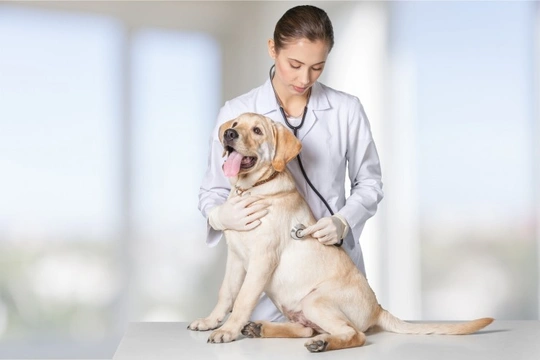
Dogs and head pressing - an emergency symptom you shouldn’t ignore
Most dog owners will have spotted their dogs “gazing at ghosts” from time to time, sitting in a corner or in front of a wall simply staring at something that is not there! However, this common if rather odd and harmless canine behaviour should not be confused with another very similar action that can indicate that something is seriously amiss with your pet, and will require urgent veterinary attention: head pressing, in which the dog sits with their head pressed up against a wall or other hard surface.
In this article, we will look at what head pressing means when performed by your dog, how to identify it, and what you should do if you spot it happening. Read on to learn more about this emergency symptom that should never be ignored, and share the information with your friends too; it might just save a life.
What is head pressing?
As mentioned, head pressing occurs when your dog deliberately presses their head up against a hard or solid object, making contact with their forehead or the bone in the brow. This is not the same thing as simply sitting close to a wall or corner and staring at it, or pressing their heads up against your leg or hand in a demand for attention or to tell other dogs or people that you belong to them!
A dog that falls asleep leaning their head against the wall is once more not a symptom of head pressing, and the head pressing tends to be repeated, prolonged, and a very active activity on the part of the dog, performed when they are awake and so, deliberately working their muscles to do it.
True head pressing is sometimes a symptom of a serious veterinary condition called prosencephalon disease, which affects the forebrain and parts of the thalamus. If this is the case, the head pressing itself is highly unlikely to be the only symptom of the condition, and a wide range of other out of character or odd behaviours are likely to accompany it too. Behavioural abnormalities and changes in behaviour or behavioural problems, obsessive pacing around or walking in circles and even fits or seizures all often go hand in hand with the condition too, and so should not be ignored.
However, this is just one of the potential diagnosis, and a whole range of serious conditions including stroke, poisoning or toxicity and liver failure can cause head pressing too, which makes this one symptom that should never be ignored.
What happens if my dog is exhibiting head pressing behaviour?
If you have identified your dog head pressing and particularly if this behaviour is accompanied by any of the other indications of a problem outlined above, you will need to contact your vet urgently in order to get them assessed and diagnosed, to either confirm or rule out prosencephalon disease and the various other options.
You vet will talk to you about the symptoms that your dog is displaying and consider this in conjunction with their veterinary history and general health, and will also generally wish to run a range of tests, including taking your dog’s blood pressure, examining their eyes, and possibly, running a CT or MRI scan if this facility is available and your vet suspects a neurological problem.
A wide range of health conditions may lead to the head pressing in dogs, potentially accompanied by a range of other potential symptoms too. Digestive disorders that affect how much salt is present in the bloodstream can also potentially lead to head pressing, as can a tumour within the brain itself that is causing pressure or pain in the head that your dog will be anxious to relieve by any means necessary.
Added to this, a physical injury such as a bang on the head or being involved in an accident can also potentially lead to head pressing, and such injuries should be checked out by your vet as soon as possible, whether or not they appear to be affected or not immediately afterwards.
What happens if my dog is diagnosed with prosencephalon disease?
If your vet finds that your dog is suffering from prosencephalon disease, which affects the forebrain and parts of the thalamus, this neurological condition is likely to affect your dog in a whole range of different ways, including pain, behavioural changes and possibly, fits and other erratic behaviour.
Once your dog has been diagnosed with the problem, your vet will need to work to determine how badly the condition is affecting your dog and how long the problem has been present, and this may well mean that they need referral to a veterinary specialist clinic, specifically one that has access to computer tomography and/or an MRI machine, expensive, specialist diagnostic aids that not many smaller clinics will own.
Whether or not the condition can be managed, treated or improved will depend on a huge range of variables, but this may involve a combination of medications, surgical procedures and adaptions to your dog’s care and management, in order to keep them safe and happy, and keep the condition manageable and under control.
The sooner that veterinary diagnosis and treatment is sought when you spot the symptoms of head pressing, the better our dog’s chances of a successful outcome will be, whatever the cause.



